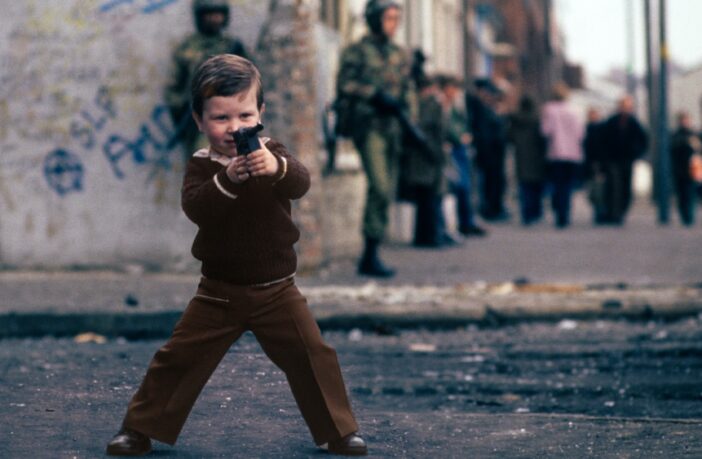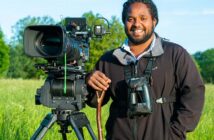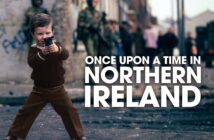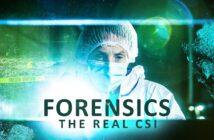A gripping new Open University/BBC co-production series on the Troubles in Northern Ireland is about to air containing interviews with people whose lives were changed forever by conflict.
The powerful new five-part documentary is broadcasting on BBC Two, BBC Northern Ireland and BBC iPlayer today, Monday 22 May at 9pm. Once Upon a Time in Northern Ireland shares intimate stories from all sides of the conflict.
Twenty-five years on from the signing of the Good Friday Agreement, this series combines archive footage with unfiltered personal accounts from those people still dealing with the legacies of the Troubles today.
Director James Bluemel, known for the award-winning series Once Upon a Time in Iraq, is behind this latest series that begins at the point when the British Army is deployed in Northern Ireland.
James said:
“While interviewing for this series, I did not feel like I was hearing another well-worn rendition of ‘The Troubles’. I was hearing a spectrum of human emotions, contradictory and confusing but also real and searching.”
Dr Philip O’Sullivan, Senior Lecturer in the School of Social Sciences and Global Studies, based in Belfast, who was the OU academic consultant, said:
“I have now lived in Belfast for over 30 years, so the history and politics of Northern Ireland and Ireland are very close to me.
“As an Open University academic who has worked closely with people involved in the conflict for over 10 years now, I think the programme is original in that it’s not the usual retelling of events from the view of professional historians and political commentators, or past and present local politicians; rather it is the extremely powerful personal testimony and witness of ordinary people who lived through extraordinary times.
“I don’t have the vocabulary to do those individual stories justice. There are many moving stories; some are inevitably very sad and still raw.
“There is no agreed narrative about the conflict in and about Northern Ireland, but that’s not the point of this series.
“In this collection of powerful personal testimonies, we hear from voices not always heard, and we see a lot of footage which I’d never seen before.
“Much of the series also strongly features the voices and experiences of women involved in and affected by the conflict, and those voices weren’t always centre stage.
“A lot of the series made for very uncomfortable viewing, but sometimes uncomfortable is a necessary thing.”
In the first episode we hear from Billy, who sees no opportunities for young Catholic nationalists like himself and becomes involved in violent street disorder – earning him the nickname of ‘the best rioter in Derry’.
Other episodes feature testimony from a sister whose brother was shot dead by paratroopers on 30 January 1972, Bloody Sunday, and a young child, Fiona, who recalls when the soldiers were initially welcomed in Derry.
That changed when her republican family had their home searched repeatedly by soldiers looking for IRA weapons.
And then there’s the son whose mother was taken away and murdered by the IRA. It was 30 years later in 2006 that the IRA revealed the whereabouts of the body of Jean McConville, mother of ten. Her son Michael recalls the day she was taken.
Other interviews throughout the series include Bernadette, who was just ten when she is told her dad, Joe, an IRA prisoner, is about to go on hunger strike.
And Brian, an ex-Special Branch (police officer) who worked with informers and agents for decades.
This series was commissioned by Broadcast & Partnerships and is supported by the Faculty of Arts and Social Sciences, with particular relevance to R23 – BA (Honours) in Social Sciences, R23 – BA (Honours) Social Sciences (Politics) and Q97 – BA (Honours) History and Politics
Picture credit: Homer Sykes; Keo Films and Walk on Air Films
- Commissioned by Dr Caroline Ogilvie, Head of Broadcast & Partnerships
- Academic Consultant: Dr Philip O’Sullivan
- Media Fellow: Dr Alison Penn
- Broadcast Project Manager: Clair Robinson
- Supporting online content: Chris Belson
Supporting Online content:
Visit our Broadcast & Partnerships site OU Connect where you can find extensive resources and information on topics related to this series including an exclusive interview about the making of the series, which will be available from 9pm on Mon 22 May.
(NB: this site may not be live or complete prior to broadcast)
This is relevant to the following qualifications and modules:
Qualification Pathways:
R23 – BA (Honours) in Social Sciences
Q69 BA (Honours) Combined Social Sciences
W68 Diploma of Higher Education Social Sciences
W40/E75 Diploma of Higher Education in Combined Social Sciences
T06/C95 Certificate of Higher Education in Social Sciences
Politics
R23 – BA (Honours) Social Sciences (Politics)
Q45 – BA (Honours) Politics, Philosophy and Economics
Q11 – BA (Honours) International Studies
History and Politics
Q97 – BA (Honours) History and Politics
W64 Diploma of Higher Education in History and Politics
History
Q01 – BA (Honours) History
Geography
R44 BA (Hons) Geography
Individual Modules:
Interdisciplinary Social Sciences modules
DD102 – Introducing the Social Sciences
DD103 – Investigating the Social World
DD206 – The Uses of Social Science
Geography modules
D225 - ‘Changing geographies, changing Britain’.
Politics modules
DD211 - Understanding politics: ideas and institutions in the modern world
DD316 - Modern Political Ideas
DD313 – International relations: continuity and change in global politics
History/Arts Modules
A111 – Discovering the arts and humanities
A113 – Revolutions
A327 – Europe 1914-1989: war, peace, modernity
A326 – Empire: 1492–1975
A332 – Why is religion controversial?
Others:
D223 – International development: making sense of a changing world



